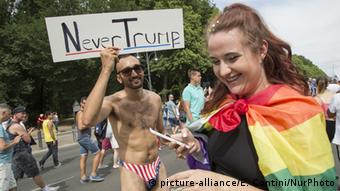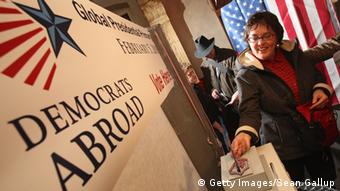American ex pats hail Clinton debate win
GERMANY
American ex-pats hail Clinton debate win
In Berlin, Americans were very pleased about Hillary Clinton's perceived win in the US presidential debate. But some questioned whether it would actually win over any undecided voters.
The first debate between Hillary Clinton and Donald Trump didn't get going until 3 a.m. Central European Time (0100 UTC), so the majority of Americans in Berlin caught up with what happened later that morning. Most were pleased that the Democratic candidate had been deemed the clear winner.
Simon Burkhardt is a guide for Segway tours in front of the Reichstag. After watching excerpts for the Clinton-Trump clash, he agreed with the media's assessment.
"Hillary Clinton won with flying colors," Burkhardt told DW. "That's because Donald Trump didn't project himself in a professional way. When confronted with his factual mistakes, he just turned reactionary. He thinks he's God. He doesn't really respond to fact checking."
Burkhardt said that, in his opinion, Trump appeared poorly prepared.
"I expected both candidates to go into the debate knowing it would be about the facts," said Burkhardt, who moved to Germany at the start of the month. "I think at this point it's about trying to appeal to those people who might vote for Hillary Clinton. So I expected him to be a little more presidential and to conduct himself with an air of responsibility. But I think he failed in that."
Burkhardt is one of the ex-patriot Americans the advocacy organization Democrats Abroad hopes to mobilize. And the head of its Berlin chapter, Gwendolyn Lynch, saw last night's debate much as he did.
"While I think Donald Trump held his ground a little more in the first portion of this debate, he quickly ran out of steam," Lynch told DW. "Within 20 minutes he seemed to lose all momentum - or fodder - he had to work with. And Secretary Clinton was able to go ahead and speak about her ideas and plans for the future of the country."
Nowhere to hide
Students at Berlin's Hertie School of Governance said that they were planning to watch a tape of the debate tonight, but indicated that they were pleased Clinton seemed to have done well. But Mark Kayser, Professor of Applied Methods and Comparative Politics, did set his alarm clock for 3 a.m.
He identified a difference between the debates of the Republican primary, which helped launch Trump to the nomination, and his encounter on Monday with Clinton.
"This is also a poor format for Trump," Kayser told DW. "He did well in the primary debates where no single candidate had enough airtime to go after his bizarre policy proposals, falsehoods, lack of depth and record of racist and sexist comments. When there are only two candidates on the stage, however, there is nowhere to hide."
Lynch was most pleased at how Clinton had handled an unorthodox opponent.
"It was a very unusual debate in that usually you have two candidates on stage who are experienced politicians," Lynch said. "In this case I think it was especially difficult because you have someone who's completely irrational and a bit crazy and who rambles on about nonsensical things. Debating against someone like that is a challenge, but it was also a virtue for Secretary Clinton because she's experienced as a debater and clearly won this first one."
A motivating event?
If there's a bright spot for Trump in all this, it's that, with the American electorate so extraordinarily polarized, the presidential debates may not change that many people's minds.
Brian Grosener, a retired US soldier who did two tours of duty in Germany, and his wife Deborah are Trump opponents on holiday in Berlin. They didn't watch the debate live and said its effect would be limited.
"I think most Americans have already decided who they're going to vote for," Brian Grosener told DW in front of the Brandenburg Gate. "There's no longer a large number of independents."
A handful of blocks down the road at the Hertie School, though, Kayser pointed out that debates can not only change minds, but also get people to cast their ballots in the first place.
"Clinton's objective was not just to disqualify Trump - he can take care of that himself - but to attract voters on the fence and motivate others to turn out and vote," Kayser said.
That's an interesting notion with regard to ex-patriot American voters. There are between 8 and 9 million Americans living abroad. They tend to be far more left-wing than Americans on average but in the past only 12 percent have voted in presidential elections.
"Yesterday between the time when the hype began and the debate itself, I had heaps and heaps of emails from people coming forward saying: I just realized the debate is happening, and I don't want to see Donald Trump as president," Kayser said. "Certainly these types of debates and live events help rally the forces for Democrats."
There is no Republican organization comparable to Democrats Abroad, and it is difficult to gauge how disappointed - or not - ex-patriot conservatives in Germany might be about Trump's performance on Monday. In any case, their candidate will get a chance to improve his perceived performance when Trump and Clinton square off in the second presidential debate on October 9.






Comments